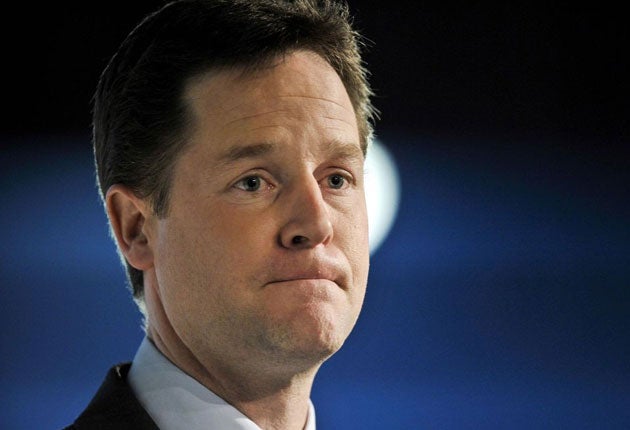Cable may abstain on tuition fees vote to appease Lib Dem rebels
Coalition party's three-way split ridiculed by Labour

Your support helps us to tell the story
From reproductive rights to climate change to Big Tech, The Independent is on the ground when the story is developing. Whether it's investigating the financials of Elon Musk's pro-Trump PAC or producing our latest documentary, 'The A Word', which shines a light on the American women fighting for reproductive rights, we know how important it is to parse out the facts from the messaging.
At such a critical moment in US history, we need reporters on the ground. Your donation allows us to keep sending journalists to speak to both sides of the story.
The Independent is trusted by Americans across the entire political spectrum. And unlike many other quality news outlets, we choose not to lock Americans out of our reporting and analysis with paywalls. We believe quality journalism should be available to everyone, paid for by those who can afford it.
Your support makes all the difference.Vince Cable, the Business Secretary, may not vote in favour of his own policy to raise university tuition fees in an attempt to bridge the deep divide among Liberal Democrats on the issue.
Mr Cable, whose department is responsible for higher education, had originally intended to support his plan to allow universities to charge up to £9,000 a year in the critical House of Commons vote later this month.
But in a highly unusual move, he is ready to abstain in the hope that the 57 Liberal Democrat MPs can unite around such a stance. He hopes that his offer will persuade some of the 13 Liberal Democrats threatening to oppose the rise to abstain instead.
Nick Clegg, the Liberal Democrat leader, had also planned to vote in favour of the fees increase but is also prepared to abstain. As Liberal Democrat MPs held their weekly meeting at Westminster last night, the plan was ridiculed by Labour. It threatens to become a presentational disaster for Mr Clegg, whose party is split three ways between MPs tempted to support, oppose or abstain on the Government's proposals. There is speculation that some MPs may resign as parliamentary private secretaries, the lowest rung on the Government ladder, so they can vote against.
Mr Cable suggested yesterday the need for party discipline would take precedence over his ministerial role. He said: "If we all abstain, then that is the position I am happy to go along with. There is an option that we all abstain together and we are considering that.
"My own instinct – partly because I am the Secretary of State responsible for universities and partly because I think the policy is right – is very much to vote for it. But we have to vote as a group, collectively, and we are discussing how we do that."
Downing Street made clear that Mr Cable would not be bound by the normal rules of collective ministerial responsibility because of the Coalition Agreement between the Conservatives and Liberal Democrats in May. This allows Liberal Democrat MPs to abstain on the higher education shake-up. The party fought the general election on a promise to phase out fees and all its MPs signed a pledge to oppose any rise.
Mr Clegg, who was repeatedly taunted in the Commons when he took Prime Minister's Questions as Deputy PM, declined to say how he would vote. Harriet Harman, the deputy Labour leader, said it would be a "cop-out" to abstain, telling Mr Clegg: "If you vote against, that's the only principled position. If you abstain, it's a cop-out, if you vote for it's a sell-out. Which is it?"
The Liberal Democrat leader pleaded for a more reasonable tone of debate on Coalition politics, saying that only backward-looking Labour MPs "regard every compromise as a betrayal".
He said that under the Coalition's plans, a care worker on £21,000 would pay back £7 a month on average, compared with £81 under the current scheme or £36 under a graduate tax. He said: "The proposal we are putting forward – we have a plan, they [Labour] have a blank sheet of paper – is fairer for students than the system we inherited from the Labour Government."
It emerged yesterday that students from Wales will be spared an increase in their tuition fees regardless of where in the UK they go to university. Leighton Andrews, the Welsh education minister, told the Welsh Assembly that students would pay the same fees in 2012 as the £3,290 they pay in the current academic year.
He is proposing to pay for the subsidy by top-slicing the teaching grant for Welsh universities. They will charge the same basic fee of £6,000 proposed for English institutions in 2012-13 and will be able to charge up to £9,000 if they can demonstrate a commitment to widening access and "other strategic objectives".
But Mr Andrews said any increase over the current level for Welsh students would be paid for them.
David Cameron accused Labour and student leaders of "peddling fantasy politics" by "pretending there's a bottomless pit of money we can dig into". He said: "It serves no-one to have underfunded universities with fraying resources and fading reputations."
Join our commenting forum
Join thought-provoking conversations, follow other Independent readers and see their replies
Comments